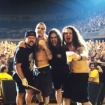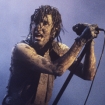Revolver has teamed with Pantera for limited-edition colored vinyl pressings of the band's classic albums plus a new Pantera collector's issue. Quantities are extremely limited — get yours before they're gone!
Despite the success of Far Beyond Driven — which debuted at No. 1 on the Billboard albums chart — when Pantera convened to make the follow-up, their style of heavy music was still way out of fashion. Rather than hitch a ride on the newly ascendant electronica or rap-rock bandwagons, the band stubbornly stayed the course on 1996's The Great Southern Trendkill. "We had all these record company people calling us at the time saying, 'Man, rap rock and rap metal's the new thing, and if you guys would just go in that direction, you'll be huge!'" Vinnie Paul says. "We're like, 'Yeah, OK, we'll make you that exact record.' They kept wanting to hear the shit and basically what we did is just create a giant bird finger to the industry. It was probably the most abrasive, obnoxious record we ever made."
"The way they made records never really changed," producer Terry Date explains. "They were very happy with the audience they had. And they wanted to make sure that they took care of those fans."
But if Pantera's bond with their fans remained as strong as ever, their internal connections, which had already begun to fray, were all but coming apart. Philip Anselmo took some time off to record the debut album, NOLA, by his longstanding side project Down and to mount a 13-date tour with the group, which also features Corrosion of Conformity's Pepper Keenan, Crowbar's Kirk Windstein and Eyehategod's Jimmy Bower. And after several years living in Arlington, Anselmo decided to move back to Louisiana; though he would fly back to Texas throughout the making of Trendkill, the singer cut all of his vocals on album at the New Orleans studio of Nine Inch Nails main man Trent Reznor.
"Phil did the Down thing," Paul remembers, "and it was really uncomfortable for the rest of us. At the time it was just like, 'What? This is the band that we all worked so hard to put together and now you're going to go do something else in the middle of what we fucking have going on here?' He never really presented it to us until we had already heard about it through the grapevine, and then he was all like, 'Ah, it's no big deal, man. I'm only going to go do a few shows and that's it.' And that ended up being the case, but at the time, I think it definitely created some tension and some unneeded animosity. And he moved to New Orleans so we weren't around each other. We couldn't communicate during our off time like we used to, so it was weird, man.
"When Phil came down when we were writing some of the music, he would disappear to the bathrooms for hours, or leave the place, and nobody really knew but we all kind of knew something was up. But then he would just go back to New Orleans. It was out of control, and it was out of control in more ways than just the music. The people that were a part of it were out of control, the whole thing was out of control. I don't even know how we finished the album. Then here comes a whole another fucking tour."
Things only became tenser between the bandmates once they hit the road. While it wasn't intended as a snub, Rex Brown thinks his decision to share a tour bus with Anselmo may have contributed to the Abbott brothers' eventual feelings of estrangement from their bassist and singer.
"Philip had his own bus, the crew got their own bus, and me, Vinnie, and Dime and our tour manager, bodyguard, and assistant were on the third," Brown explains. "Dime would be up at 6 in the morning on our bus, just fucking cranking the stereo, and the guys that wanted to sleep, or were sick or whatever, they were pretty much fucked. Phil said to me, 'You know, you can use the other half of my bus if you want to be more comfortable.' I was like, 'Fuck, that'd be perfect!' So I think that, when I jumped rides, Vinnie and Dime might have thought something was up. But it was just that I wanted to have my own space."
More serious, on several levels, was Anselmo's heroin overdose after a show in Dallas in 1996. The singer went into cardiac arrest and was legally dead for four to five minutes before paramedics were able to revive him; according to Paul, no one else in the band even knew that Anselmo was using until he OD'd. "Honestly, I think the ultimate turning point for them was Philip starting to do heroin," says manager Kim Zide-Davis. "But I think that's blatantly obvious. Anybody who gets into that scenario, it's a complete change and nothing can ever be the same again."
Anselmo says that he turned to heroin, introduced to the drug by "some crazy punk-rock girl from New York," after a long agonizing search for relief for his chronic back pain, which culminated, according to the singer, in three ruptured discs with DDD, Degenerative Disc Disease. "Basically, what that means is your spine is slowly crumbling upwards," Anselmo explains. He says he went to doctor after doctor but was either turned down for treatment or told that corrective surgery would require one to two years of recovering time, during which he wouldn't be able to play with Pantera, and carried a 50 percent chance of paralysis. "The procedures they were describing to me were fucking unacceptable," he says. "So I felt cornered. Yep, painkillers, muscle relaxers, anything I could get my fucking hands on. As long as it numbed out the fucking knife that I felt in my fucking spine, in the center of my body, before I had to go out there and go apeshit for the kids. Fuck yeah, there's no denying it and no hiding it. I was fucking annihilated."
Anselmo admits that, when it came to Pantera, his overdose "changed everything." "From that point on, there was no more back problem, just a drug problem," he says of how his bandmates viewed him. "In hindsight, if someone cannot feel the pain, they're not going to fucking understand at all: All they see is the drug addict. And you know what? It's true. I could see it. The rest of the fellas, they did have resentment towards me. That's the sad part. It's almost like accepting fate at that point. You feel doomed. At the time, I felt fucking doomed. Maybe I could have not stepped all the way off the fucking plank and fell into the ocean, but I did. It comes with the territory, not trying to get off, or saying, 'Whoa, it was OK for me to do heroin.' It was not OK for me to do heroin. Heroin is definable evil. I poisoned myself purposefully, and if I didn't wake up the next day, maybe back then… Gosh, man, to think about not giving a fuck about dying... That's a condemned man. It was very powerful."
According to Paul, everyone in Pantera wanted to help Anselmo but the singer wasn't having any of it. "He didn't want anyone helping him," the drummer says. "You know how people are: The people that are trying to help you are your worst enemies. When you're in that situation, you don't want to hear anything anyone has to say. We would go to do meet and greets, and 10 minutes before we'd show up to the record store to do something, he'd be sitting on the front of the bus with a cigarette hanging out of his mouth burning the front of his shirt, falling all over his face with all of us shaking him saying, 'Phil, we have to go do this fucking meet and greet.' He wouldn't know where he was. It was embarrassing. These kids would be there saying, 'Phil, Phil, we love you man! Pantera!' And he's, like, putting an 'X' on shit for his name. It was just fucking hard. Dime would videotape the dude and say, 'Here, I want you to see what you're doing to yourself and us,' and he'd say, 'I'm not watching that shit. Fuck you. Get that shit away from me.' You just can't help him. It's got to come to a point where they want to help themselves. At the same time, we had this huge record label behind us. Everyone's like, 'Hey, man, after that fucking horrible tour with all the nightmares we all went through, guess what? We just got offered to do the Black Sabbath reunion tour. Let's hurry up and put out a fucking live album.' It never stopped. There was never really a chance for anything to straighten out."












